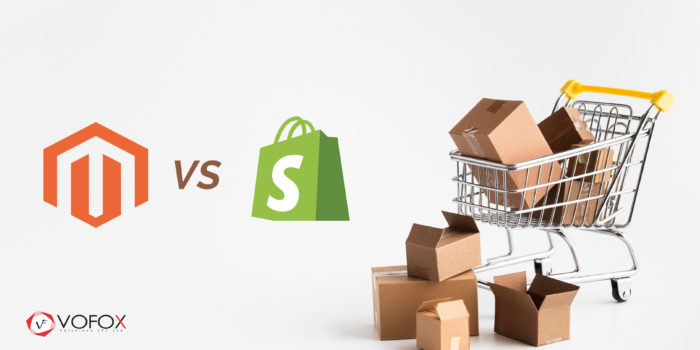- December 29, 2020 6:02 pm
- by Manek
- December 29, 2020 6:02 pm
- by Manek

Today, setting up an online store is much easier than what we needed to do in the past. However, choosing the right e-commerce platform really determines the growth of your e-commerce business. In order to deliver your customers with engaging shopping environments, streamline your business efficiency, and increase ROI, you need a highly agile and scalable cloud-based e-commerce platform. Although there are plenty of e-commerce platforms that are available today, Magento and Shopify are the two eCommerce platforms that are popular among eCommerce businesses all over the world. In this blog post, we will explain to you in detail about both these platforms and point out each of their pros and cons. This will help you to make better decisions in choosing the right platform for your online store.
Magento is now one of the most advanced, scalable, feature packed, and flexible e-commerce platforms that are available in the market. Magento offers you an extensive suite of powerful tools, extensions, and plugins for building and operating your e-commerce store. Magento comes with two editions, Magento Open Source, and Magento Commerce. We will talk about these two editions in detail below.
Magento Commerce: This edition was previously known as Magento Enterprise. To get this software, you need to pay a fee. Magento Commerce ships with some pretty cool features that allow you to integrate a variety of third-party tools, offers a high amount of scalability, and some other features that are not available with the free edition of Magento. All you need to do to build an online store in this edition is to buy a license by creating an account on their official page.
Magento Open Source Edition(formerly Magento Community): If you don’t want to spend extra money on the platform and you are on a budget, Magento Open source is the one you must go for. However, this edition won’t give you the extra features that Magento Commerce delivers.
Let’s dive into some of the pros and cons of this eCommerce platform in detail.
The Magento eCommerce development platform is crafted exclusively for limitless customization and the fun part is you can customize or modify the code in the way you want without affecting the features and functionality of your existing feature or the features that you are planning to implement in the future. The platform is open source. Therefore, you can modify the code, customize templates, and develop the functionality exactly the way you want. If Magento lacks a specific functionality you need, you can easily integrate third-party plugins or build it from scratch to enrich your store with more features.
As we said above, Magento is literally the only eCommerce platform that supports a great range of third party plugins and extensions. Apart from having the support to integrate a variety of third party extensions, the platform also has hundreds of native extensions available in it. With Magento Marketplace, you can manage all of your e-commerce business processes such as shipping, tax, payments, and more. On top of that, Magento also delivers APIs for the integration of a variety of third-party applications such as payment processors, ERPs, CRMs, WMS(Warehouse Management System), Vendor Management System, and much more.
One of the major challenges e-commerce businesses face these days is getting a top position on the search engine result page. This is because of the fierce competition of your competitors to rank higher on the SERP. As there are a huge number of online stores competing for exactly the same keywords that you are trying to rank, attracting more visitors to your store via search engines is still considered a valuable process for any eCommerce business. Magento ships with in-built SEO features that allow you to optimize the contents of your store so that it can rank well. You can also edit your store’s meta tags and page header. These SEO features help you rank higher in search engines.
Due to the complexity of Magento, you need a pretty large development team who have good skills in PHP programming language(Magento is written in PHP). It can be extremely hard for someone who lacks technical skills in PHP to build an eCommerce store on Magento. You often need to shell loads of money to hire Magento developers to build your e-commerce store. In order to keep your e-commerce development expenses low, it is better to hire Magento developers from the best Magento Development Company in India.
Shopify delivers you an all in one eCommerce solution that helps you to easily build an eCommerce store and start selling your products right away. With an intuitive user interface, drag and drop store builder, easy-to-use control panel, order management functionalities, and easily organized products, Shopify is an easy to use eCommerce solution that can be set up even by someone who doesn’t have that many technical skills. However, by being an end-to-end eCommerce solution, there are some ups and downs to this solution. Let’s have a look at it below.
The great advantage of Shopify is its dedicated support team. They deliver you with round the clock support and you can raise your technical queries via voice, live chat, or email.
Apart from picking a theme and adding your content to it and deploying your store right away, you can also customize your store the way you want it. In order to accomplish this, you can use Shopify’s customizable website builder. Shopify gives you a nearly functioning structure of an e-commerce store, all you have to do is to start building your store step by step using the drag and drop feature of the website builder. However, Shopify doesn’t give you the freedom to customize your store in the way you can do in Magento.
Another convenient feature that you get out of this e-commerce solution is its web hosting. With Shopify, you don’t have to look for any third party web hosting provider given that everything is neatly handled in just one place.
Although Shopify offers hundreds of templates, you often need to customize your website to add additional functionalities If you For customizable platform elements, Shopify uses a proprietary coding language with limited developer support, transforming site development projects – and even routine maintenance –into a difficult, costly process
Shopify environments are generated using rigid, standardized web templates that limit innovation, leaving you with a store resembling every other Shopify merchant. While some experiential elements can be modified, several of the most important customer interactions can’t be customized such as the checkout process
Since Shopify is engineered for B2C use cases, their template-based approach is unable to handle the complexities of B2B transactions and associated workflows. Features required by large and growing companies including order management, complex product catalogs, and subsite functionality, aren’t supported by Shopify.
Guaranteed Response within One Business Day!
What is Infrastructure as Code (IaC)?

Front-End Performance in 2026: What Core Web Vitals Actually Mean for Your Site

What is FinOps?

Micro-Frontends: Breaking Down Monolithic React Applications
.png)
Zero-Trust Security Models for SaaS: What You Need to Know